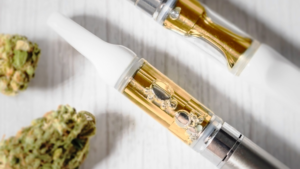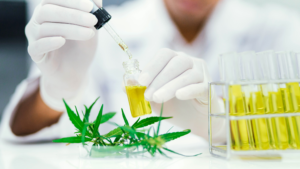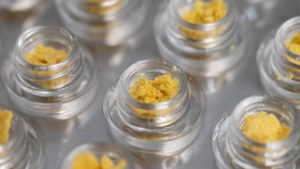Delta 10 vs Delta 8: Are There Big Differences?
There are potentially hundreds of cannabinoids found in the cannabis plant.
It can get confusing for medical cannabis patients when they see different labels for products that are related to cannabis, such as delta-8, delta-9, or delta-10 THC, and other cannabinoids like CBN, CBD, or CBC, just to name a few.
When it comes to Delta 8 and Delta 10, however, isn’t it all just THC, the part of the cannabis plant known to get people “high”? Not exactly.
Cannabis plants are complex, and contain various compounds that may or may not produce psychoactive effects called cannabinoids.
In this article, we’ll break down Delta 10 vs. Delta 8 THC to help you understand the difference, and whether these cannabinoids have medical benefits as a medical cannabis patient.
What are cannabinoids?
Cannabinoids are a class of chemical compounds that interact with the cannabinoid receptors in the human body’s endocannabinoid system, which is often known as a “master conductor” that helps regulate all our bodily systems.
They affect various physiological processes and have been studied for their potential medical uses, including relieving pain and chronic pain, appetite stimulation, neuroprotective properties, energizing effects, and reducing inflammation.
Where do cannabinoids come from?
Cannabinoids can be naturally derived from the cannabis plant (known as phytocannabinoids) or synthetically produced, and they also exist within the human body (known as endocannabinoids), with the most commonly known endocannabinoid being anandamide, or the “bliss molecule”.
The most well-known cannabinoid found within cannabis plants is delta-9-tetrahydrocannabinol (THC), which is responsible for the psychoactive effects of cannabis. Now products are being sold on the shelves with Delta 8 and Delta 10 THC, with many people being confused as to what they are, how they differ from one another, and whether they have medical benefits.
What is Delta 8 THC?
Delta 8 THC was discovered by the late “The Godfather of Cannabis” Raphael Mechoulam, who also discovered the endocannabinoid system and the entourage effect, yet it wasn’t until recently that the potential benefits of Delta-8 became recognized. Delta 8 THC rose in popularity, and continues to rise, with the passing of The Farm Bill of 2018, which made the extraction of cannabinoids like CBD from hemp federally legal.
Does Delta 8 THC Get You High?
Delta 8 THC is sometimes referred to as “THC lite” because while it does produce intoxicating and psychoactive effects like Delta 9 THC Delta 8, it is known to provide a milder high than Delta 9 THC.
Delta 8 and Delta 9 THC have similar chemical structures, with the location of the double bond (on the eighth carbon ring) being the only difference, yet this structural difference impacts how it bonds to the cannabinoid receptors in our endocannabinoid system.
Delta 8 and Delta 10 and the Endocannabinoid System
Delta 8 has a stronger ability to bind to the CB2 receptors within the endocannabinoid system, which are located throughout the body, particularly in the digestive and immune systems.
While Delta 9 THC binds stronger to the CB1 receptors, Delta 8 THC doesn’t bind in the same way, creating the hypothesis of why the psychoactive effects of D8 are less intense. The said is to be the same of Delta 10, which has a similar molecular structure as Delta 8, but provides more calming effects, and will be discussed later in this article.
While Delta 8 THC is psychoactive, the effects are more associated with a clearer head without the intense high that often causes people to feel “couch lock” or a bit foggy.
Proponents of D8 claim that it provides the uplifting feeling and the euphoric high of Delta 9 THC, without loss of function or the ability to be effective or productive.
Are Delta 8 and Delta 10 Products Safe?
Once it was discovered that D8 could fall under The Farm Bill, it has been widely exploited, and able to be found in many stores where CBD can also be found, however, many states have banned it due safety concerns and shady companies putting out unsafe products.
It should be noted that Delta 8 and Delta 10 products are not federally regulated and not technically federally legal, thus, there are no guidelines that protect the safety of products that are sold in stores from gas stations to grocery stores to convenience stores.
This is why it is beneficial to have a medical marijuana card in your state if it is legal, because products containing Delta 9 THC will be regulated by the state you’re purchasing them in.
What is Delta 10 THC?
More products are becoming available across states that have Delta 10 THC, claiming to have various benefits for those who use it.
Delta 10 also is said to have a mild effect compared to Delta 9 THC. Delta 10 products come in similar forms to products with other THC forms such as edibles, vapes, flower, tinctures, and cannabis oil.
Delta 10 vs Delta 8: Similarities and Differences
Delta 10 THC is has a chemical structure that is similar to Delta 8 THC. It also engages the body’s cannabinoid receptors in a similar way that Delta 8 does.
The largest noted difference between Delta 10 vs Delta 8 THC is that it produces more relaxing, sedative effects than the euphoric effects and energetic effects Delta 8 is known for.
Are Delta 8 and Delta 10 Synthetic Cannabinoids or Naturally Found in the Cannabis Plant?
Both Delta 8 and Delta 10 THC are not naturally occurring in high concentrations in certain cannabis cultivars (“strains)”, meaning that there is no such thing as a type of cannabis or hemp that could be classified as Delta 8 or Delta 10-rich flower.
Both Delta 8 and Delta 10 are often classified as synthetic cannabinoids.
Both Delta 8 and Delta 10 can be created (or synthesized) as a result of converting CBD through a process called isomerization. Isomerization occurs in a stable, sterile, and highly technical lab to produce Delta 8 that is free of contaminants.
That being said, it’s important that our medical patients understand that not all Delta 8 and Delta 10 products are created equal, or in sterile, stable environments.
One of the criticisms of these cannabinoids is that there are a lot of “garage scientists” that will mass produce Delta 8 and Delta 10 products that are unsafe with harmful contaminants, or may even run “hot” and contain more than negligible amounts of Delta 9 THC, thus making them illegal.
Is Delta 9 Safer than Delta 8 and Delta 10?
Again, there are no federal regulations that dictate how Delta 8 and Delta 10 products are made, and it’s rare that companies will offer lab reports verifying the safety of cannabis products containing Delta 8 or Delta 10 THC.
Those who say Delta 8 and Delta 10 are synthetic will argue that because they are created through isomerization, it is a synthetic process, thus making Delta 8 synthetically derived, and non-natural cannabinoid.
If you ask us, there is a big difference between the synthetically derived cannabinoids that you can find in a gas station vs the naturally-derived, regulated ones like Delta 9 THC and CBD that you will find in a safe dispensary, with higher potency, and a clear legal status when you have your medical marijuana card.
This one key difference is important for people to pay attention to.
Does Delta 8 THC Have Medical Benefits?
At Compassionate Clinics of America, we are very concerned with providing medical cannabis recommendations based on the available, growing research base on cannabis.
While we’re glad to see that our understanding of THC, CBD and other cannabinoids, as well as terpenes, and how they impact the medical cannabis experience has evolved, we can’t say that we feel as confident yet about Delta 8 or Delta 10 based on a significant lack of research on this relatively new cannabinoid.
Does Delta 8 Have Beneficial Effects?
What researchers are looking at with Delta 8 is whether it has the potential to provide similar benefits to other cannabinoids by the way it binds to cannabinoid receptors.
While Delta 8 is believed to bind to the CB2 more effectively than the CB1, it has been reported that Delta 8 also binds to the CB1 receptor and may hold anti-anxiety, anti-nausea, and pain-relieving properties.
Because it’s claimed that Delta 8 has many of the properties of Delta 9 THC without the strong psychoactive effect, some of the research on Delta 8 has focused on nausea and appetite stimulation for those who want to experience the benefits of THC but without the “high”.
What is Some of the Delta 8 Research?
A study on youth undergoing chemotherapy treatment found that pre-treatment with Delta 8 prevented vomiting with little to no side effects. In this study, researchers described Delta 8 as “an efficient new cannabinoid” with “lower psychotropic potency than the main cannabis constituent, delta-9-THC.”
Another animal study observed that Delta 8 had appetite stimulating properties, increased food consumption, and had a tendency to improve cognitive function.
Does Delta 8 Provide Pain Relief?
A 2018 study on mice found that Delta 8 helped to manage symptoms related to pain and inflammation when ingested, inhaled, and used topically. An older 1977 study, recognizing that Delta 8 has been around for a long time, found similar potential anti-inflammatory properties in animal subjects.
Does Delta 10 Have Health Benefits?
The research on Delta 10 is lacking for us to make definitive conclusions about this new cannabinoid that is yet to be fully understood for medical purposes. Therefore, we cannot in good faith provide definitive research suggesting that this not-well-understood cannabinoid has medical benefits, especially when the research other cannabinoids like Delta 9 THC and CBD has grown exponentially.
Those who use Delta 10 will report milder effects than Delta 9 THC with fewer psychoactive properties. They’ll also report that it brings sedative effects compared to the mild euphoria reported by Delta 8 THC, and therefore may help to relieve stress. Delta 10 does get one “high” however, the Delta 9 that you will find within legal medical dispensaries and recreational cannabis retail stores definitely has a higher potency.
Are Delta 8 and Delta 10 THC Right for You?
While there may be an ongoing argument as to whether Delta 8 and Delta 10 are synthetic cannabinoids, many are advocating for their recognition in cannabis medicine as well as recreational cannabis markets. In fact, so many people feel so strongly about Delta 8 that their advocacy for the cannabinoid has almost shadowed that of the fight for federal legalization of cannabis and cannabinoids all together.
Many people in prohibition states are turning to Delta 8 and Delta 10 as a means to experience the benefits of Delta 9 THC, yet at Compassionate Clinics of America, we encourage our patients to understand that several parts of the cannabis plant are just being discovered, and there is a lot of research to be done before we know the full implications of their applications, benefits, or potential harms.
Connect with us at Compassionate Clinics of America to discuss getting your medical cannabis recommendation with a qualified medical professional to learn more about our approach to providing as much education as possible to our patients to help guide them through their journey with medical cannabis.
Be sure to read the articles on our blog and stay tuned to this space as we continue to release more information to ensure those who receive a medical cannabis certification from us are empowered in their journey towards healing, health, and well-being.


























